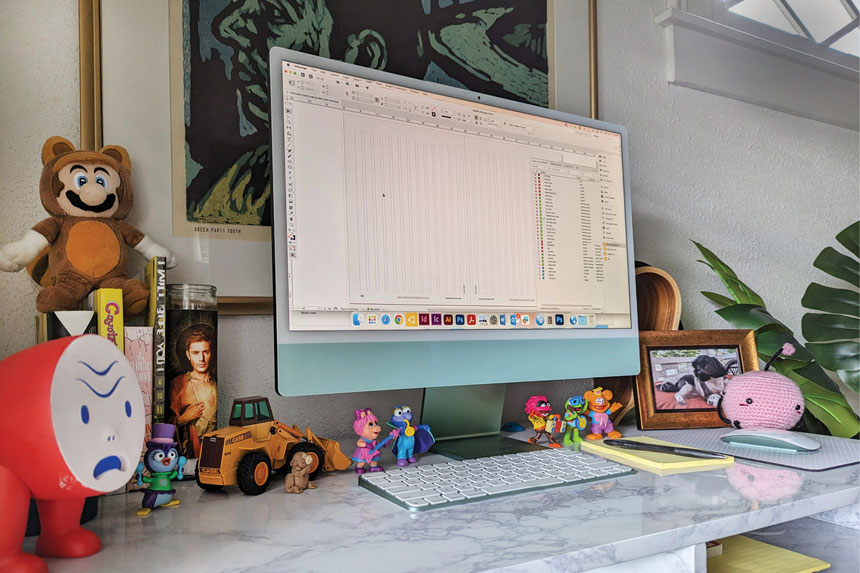Even if you have but a passing familiarity with the vastness of the internet, you’ll not be astonished to learn that some people go there to share detailed descriptions of what they’ve placed atop their desks. As if we cared.
Well, some of us do. I do. All those tchotchkes, whether artfully arranged or scattered haphazardly, are a clue not just to how we work, but who we are. I have learned by asking around that the crap — I mean the quirky, goofy, sentimental, nostalgic items — we plop on our desks offers a glimpse into our heart, if not our very soul.
These days, post-pandemic, lots of people work from home. Your desk may be a chunk of polished mahogany in a spare bedroom, or it may be a kitchen table. Doesn’t matter. Furthermore, and no judging here, but you may be the type who stocks fine liquors and an impressive collection of adult toys in a bottom drawer. Cool, that’s your privilege, and I don’t care for details about the toys. Likely no one, including you, is seeing those things on a daily basis. However, we spend hours staring at what we’ve curated for prime position up top. So yes, it matters.
According to scholars who study the topic, there are basically two general theories about how we choreograph desktops: Sloppy vs. neat. (Irrespective of style, “go-getters” are more likely to keep pictures of kids in their immediate workspace, one study concluded. I assume it means their kids.) A team of researchers from the University of Minnesota reported that it’s slobs who may in fact be more creative. “Disorderly environments seem to inspire breaking free of tradition, which can produce fresh insights,” they say.
Me, I’m a neatnik. It pains me to acknowledge that some professors doubtless think I’m a dullard, but they may be right. Everything on my desk, a large glass affair, is always positioned exactly where it belongs. Over time, items have come and gone. One, however, has earned a prominent position on every desk I’ve owned, in every state, over the last 40 years. It is — and I ask that you hold your laughter — a heavy, stainless steel duck about the size of an apple. The duck is attached by a footlong chain to a rubber drain stopper. It’s signed and numbered and was sent to me by an artist I’ve never met.
Among my friends, I’ve learned that special-edition beer cans, commemorative paperweights, dried wedding bouquets, rare coins, and other similarly nostalgic artifacts are far and away the most common items found on their desks. One of the more affecting I recently learned about is owned by Peter Richmond, a prolific author whose work I’ve long admired. In a message, he told me about his model railroad car, the kind a serious hobbyist might cherish. He sent a picture of it on his desk. The thing is a beaut. It had belonged to his father, a frequent rail passenger, who died in a plane crash in 1960. “The last time I saw him might have been as a seven-year-old, waving from the back of the train he’d just gotten on to go to work,” Richmond wrote to me.
Perhaps my favorite desk ornament belongs to a former entertainment PR pro who maintains within arm’s length a voodoo doll that once included “strands of hair from a boss I hated.” Whoa. How exactly was that human hair procured? “I didn’t pursue it,” she explained to me in a quick note. An unequivocally wise decision, I’d say.
In the last issue, Cable Neuhaus wrote about the pop cultural phenomenon known as Shark Week.
This article is featured in the September/October 2023 issue of The Saturday Evening Post. Subscribe to the magazine for more art, inspiring stories, fiction, humor, and features from our archives.
Become a Saturday Evening Post member and enjoy unlimited access. Subscribe now




Comments
Certainly enjoyed what ones desktop reveals. The multiple truths were amazing.